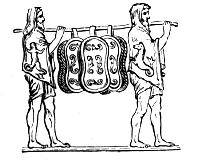
Aulus Gellius was a Roman author and grammarian, who was probably born and certainly brought up in Rome. He was educated in Athens, after which he returned to Rome. He is famous for his Attic Nights, a commonplace book, or compilation of notes on grammar, philosophy, history, antiquarianism, and other subjects, preserving fragments of the works of many authors who might otherwise be unknown today.

Priscianus Caesariensis, commonly known as Priscian, was a Latin grammarian and the author of the Institutes of Grammar, which was the standard textbook for the study of Latin during the Middle Ages. It also provided the raw material for the field of speculative grammar.
Gaius Caesius Bassus was a Roman lyric poet who lived in the reign of Nero.
Macrobius Ambrosius Theodosius, usually referred to as Macrobius, was a Roman provincial who lived during the early fifth century, during late antiquity, the period of time corresponding to the Later Roman Empire, and when Latin was as widespread as Greek among the elite. He is primarily known for his writings, which include the widely copied and read Commentarii in Somnium Scipionis about Somnium Scipionis, which was one of the most important sources for Neoplatonism in the Latin West during the Middle Ages; the Saturnalia, a compendium of ancient Roman religious and antiquarian lore; and De differentiis et societatibus graeci latinique verbi, which is now lost. He is the basis for the protagonist Manlius in Iain Pears' book The Dream of Scipio.

The Carmen Saliare is a fragment of archaic Latin, which played a part in the rituals performed by the Salii of Ancient Rome. There are 35 extant fragments of the Carmen Saliare, which can be read in Morel's FPL.
Terentianus, surnamed Maurus, was a Latin grammarian and writer on prosody who flourished probably at the end of the 2nd century AD.
Marcus Verrius Flaccus was a Roman grammarian and teacher who flourished under Augustus and Tiberius.
Helenius Acron was a Roman commentator and grammarian, probably of the 3rd century AD, but whose precise date is not known.
Flavius Caper was a Roman grammarian of Latin who flourished during the 2nd century AD.
Rutilius Taurus Aemilianus Palladius, also known as Palladius Rutilius Taurus Aemilianus or most often just as Palladius, was an ancient writer who wrote in Latin, and is dated variously to the later 4th century or first half of the 5th century AD. He is principally known for his book on agriculture, Opus agriculturae, sometimes known as De re rustica.
Flavius Sosipater Charisius was a Latin grammarian.
Aemilius Asper, Latin grammarian, possibly lived in the 1st century AD or late 2nd century AD.
Publius Consentius was a 5th-century Latin grammarian and the author of two treatises, which are perhaps the fragments of a complete grammar: Ars de duabus partibus orationis, nomine et verbo, on the noun and the verb, which was much used during the Carolingian period, and Ars de barbarismis et metaplasmis, on barbarisms and metaplasm. The latter refers to a third essay, De structurarum ratione, on the structure of sentences, which, if ever published, no longer exists.
Arusianus Messius, or Messus, Latin grammarian, flourished in the 4th century.
Dositheus Magister was a Greek grammarian who flourished in Rome in the 4th century AD.
Velius Longus, Latin grammarian during the reign of Trajan, author of an extant treatise on orthography. He is mentioned by Macrobius and Servius as a commentator on Virgil.
The gens Terentia was a plebeian family at ancient Rome. Dionysius mentions a Gaius Terentius Arsa, tribune of the plebs in 462 BC, but Livy calls him Terentilius, and from inscriptions this would seem to be a separate gens. No other Terentii appear in history until the time of the Second Punic War. Gaius Terentius Varro, one of the Roman commanders at the Battle of Cannae in 216 BC, was the first to hold the consulship. Members of this family are found as late as the third century AD.
An ars grammatica is a generic or proper title for surveys of Latin grammar. The first ars grammatica seems to have been composed by Remmius Palaemon, but is now lost. The most famous ars grammatica since late antiquity has been that composed by Donatus.
Tra quante regione is a ballata by the late medieval and early renaissance composer Hugo de Lantins. As with another vocal composition by Guillaume Dufay entitled Vasilissa ergo gaude, Lantins' ballata celebrated the marriage of the Italian princess Cleofa Malatesta with the Byzantine Despot of the Morea Theodore II Palaiologos. The marriage took place on 21 January 1421 or sometime in 1422 in Mystra. The actual date and place of the first performance remain disputed

Theodor Heinrich Gottfried Keil was a German classical philologist. He was a son-in-law to educator Friedrich August Eckstein (1810–1885).



